

Experiential Learning Cycles - Overview of 9 Experiential Learning Cycle models. How, exactly, do people "learn from experience"?
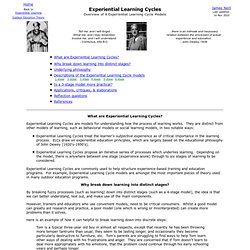
The most famous response to this question comes from John Dewey's philosophy of education (see 500 Word Summary of John Dewey's "Experience & Education"). The underlying philosophy of experiential learning cycle (ELC) models is Deweyian. By Deweyian is meant that Experiential Learning Cycle models emphasize that the nature of experience as of fundamental importance and concern in education and training. A further, Deweyian assumption underlying ELCs is that people learn experientially and that some experiences are educative whilst other experiences are miseducative.
All experiences are understood to be continuous, that is, each experience influences each future experience. It is the teacher's responsibility to structure and organize a series of experiences which positively influence each individual's potential future experiences (Dewey, 1938/1997). This can be easier to understand with an extremely negative example, such as child abuse. Blended Learning Best Practices. QM_Standards_2011-2013-3. Best Practices in Designing Online Courses. Best Practices in Designing Online Courses Las Positas College This document, along with the accompanying examples, was created to help LPC faculty design online courses that are instructionally and pedagogically sound.
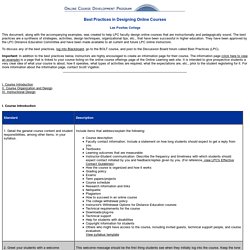
The best practices are a synthesis of strategies, activities, design techniques, organizational tips, etc., that have been successful in higher education. They have been approved by the LPC Distance Education Committee and have been made available to all current and future LPC online instructors. To discuss any of the best practices, log into Blackboard, go to the BOLT course, and post to the Discussion Board forum called Best Practices (LPC). Important: In addition to the best practices below, instructors are highly encouraged to create an information page for their course. I. I. II. III. The 25 Secrets To Design Every Teacher Should Know. Examples of Blended Classes and Class Flow. The following are examples of blended courses taught at institutions in the United States.
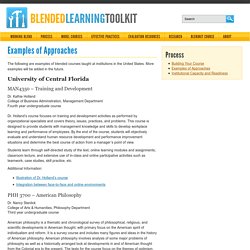
More examples will be added in the future. University of Central Florida MAN4350 – Training and Development Dr. Kathie Holland College of Business Administration, Management Department Fourth year undergraduate course Dr. Students learn through self-directed study of the text, online learning modules and assignments, classroom lecture, and extensive use of in-class and online participative activities such as teamwork, case studies, skill practice, etc.
Additional Information: PHH 3700 – American Philosophy Dr. American philosophy is a thematic and chronological survey of philosophical, religious, and scientific developments in American thought, with primary focus on the American spirit of individualism and reform. Additional information: Illustration of Dr. MAN3025 – Management of Organizations Dr. Dr. Illustration of Dr. Simmons College. Online Course Best Practices - GREAT RESOURCE! Best Practices « SHSUOnline Blog. Welcome to the Best Practices for Teaching online or as we like to call it: Strategies for Success in your Online Course page.
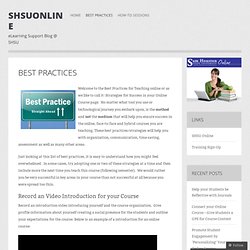
No matter what tool you use or technological journey you embark upon, is the method and not the medium that will help you ensure success in the online, face-to-face and hybrid courses you are teaching. These best practices/strategies will help you with organization, communication, time saving, assessment as well as many other areas. Just looking at this list of best practices, it is easy to understand how you might feel overwhelmed.
In some cases, try adopting one or two of these strategies at a time and then include more the next time you teach this course (following semester). We would rather you be very successful in key areas in your course than not successful at all because you were spread too thin. Record an Video Introduction for your Course Record an introduction video introducing yourself and the course organization. Employ a Syllabus Quiz Like this: Competencies for Online Teaching Success (COTS) What it takes to develop online classes. I found this infographic created by Lean Forward on the fine educational website Edudemic and I thought I would share it with you.
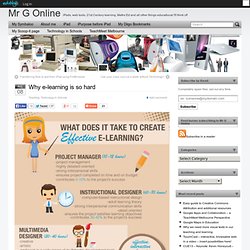
The author of the post, Jeff Dunn, feels it is missing one important role, the teacher. My take on this infographic is that these are the roles the teacher takes on when implementing e-learning. Yes, the teacher does have to ensure good pedagogy is involved in any e-learning but on the other hand e-learning can be seen as THE pedagogy. Whatever way you look at it, though, it’s a fairly large workload to take on. As Project Manager, the teacher ensures the learning is on track, supporting the students in managing their time and workflow. As Instructional designer, the teacher is ensuring that the students have all the necessary skills and tools to complete their task.
As Multimedia designer, the teacher’s role is to support the level of creativity that is possible through using tech tools. This is the key pedagogical component. Seven Principles of Effective Teaching: A Practical Lens for Evaluating Online Courses. Note: This article was originally published in The Technology Source ( as: Charles Graham, Kursat Cagiltay, Byung-Ro Lim, Joni Craner, and Thomas M.
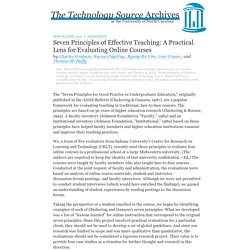
Duffy "Seven Principles of Effective Teaching: A Practical Lens for Evaluating Online Courses" The Technology Source, March/April 2001. Available online at The article is reprinted here with permission of the publisher. The "Seven Principles for Good Practice in Undergraduate Education," originally published in the AAHE Bulletin (Chickering & Gamson, 1987), are a popular framework for evaluating teaching in traditional, face-to-face courses.